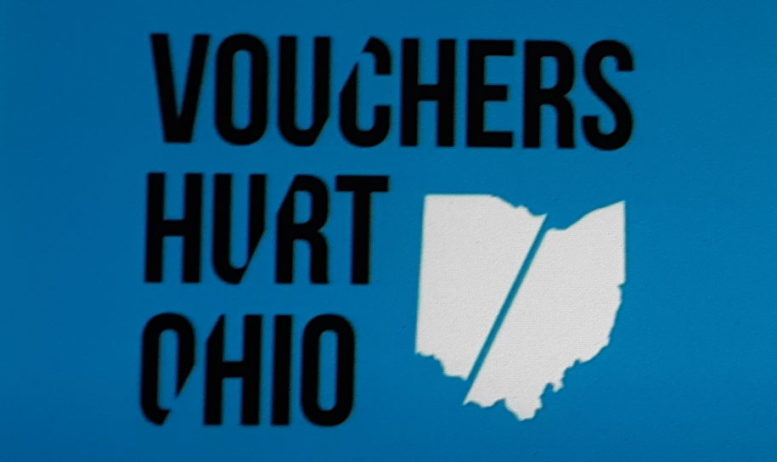By JAN LARSON McLAUGHLIN
BG Independent News
The siphoning of public funds to pay for private schools is a threat to Ohio’s education system, leading more than 210 school districts to join a lawsuit against vouchers.
The lawsuit, filed in January, contends that using public monies to pay for vouchers to private schools is unconstitutional. Representatives of the Ohio Coalition for Equity and Adequacy in School Funding, presented their case earlier this week in Bowling Green in an effort to get more school districts to join the battle.
Leading the charge is Bill Phillis – a true believer in public education, who started his teaching career in 1958.
“There is a major assault on the public systems,” Phillis said. “It’s the system for all the children of all the people.”
Vouchers were originally portrayed as a method to get students out of failing public schools.
“When it started, it was designed to help impoverished families trapped in poor performing districts,” said Dennis Willard, a spokesperson for Vouchers Hurt Ohio. “We know that’s not true.”
Ninety-five percent of the children awarded EdChoice vouchers were already enrolled in private schools. So rather than affording children an opportunity to escape poor schools to attend private schools, the vouchers are acting as a refund for their parents while draining dollars from public schools.
The threat against public education is real, according to Phillis and Willard.
“This truly is not a drill,” Willard said. “This is an existential threat to our system.”
Since 2000, more than $25 billion in state funds have gone to vouchers and charter schools, Phillis said. The shift is bankrolled by some deep pockets aimed at the privatization of public education, he said.
“This is going to be an uphill battle,” Phillis said. “There are so many well-funded groups that are going to fight us tooth and nail.”
But the lawsuit has the Ohio Constitution on its side, Willard said. Draining public funds for private schools is unconstitutional, he said, for the following five reasons:
- First, Ohio’s Constitution clearly states that public funds should be used to support “a single system of common schools.” Just as the state doesn’t pay for private swimming pools for people not wanting to use a public pool, it shouldn’t use public tax dollars for private schools, Willard said.
- Second, the state is already failing to fully fund public schools, as ordered by the Fair School Funding Plan. Funneling those funds to private schools further shortchanges public schools. The framers of Ohio’s Constitution rejected putting tax dollars into private schools in 1851 and again in 1873-74. EdChoice vouchers and public school funds come out of the same budget – with all the growth in the budget during the last five years going to voucher programs. “That’s unconstitutional,” Willard said.
- Third, state funded vouchers make segregation worse in Ohio since private schools can reject students based on their race, religion or economics. Private schools can accept or turn away students due to their disabilities, disciplinary records, or academics. Not so with public schools, Willard said. “You open your doors to everyone. You’re the Statue of Liberty of education,” he said.
- Fourth, state founders ruled that no public funds be used for religious schools – with 90% of private schools in Ohio being parochial. Draining of public school funds has led to many districts needing to pass levies to make up the difference. That has increased the reliance on property taxes, which the Ohio Supreme Court has ruled is unfair.
- And fifth, is the equal protection clause in the Ohio Constitution. “We believe education is a fundamental right,” Willard said.
Willard explained that the lawsuit organizers are not opposed to private schools – just the use of public tax money to pay for them.
“I’m not anti private schools,” he said. “But don’t take our tax dollars to do this.”
Representatives of at least five area school districts, all which lost funding due to the EdChoice voucher program, attended the meeting earlier this week on the lawsuit. Their boards will weigh if their districts should join the other 200-plus districts in the case.
Bowling Green Board of Education will be faced with that decision.
“Public schools have to do everything they can to protect the dollars of the district,” Bowling Green Superintendent Francis Scruci said. “I think they made a very strong argument.”
This is not the first battle for school funding undertaken by the Ohio Coalition for Equity and Adequacy of School Funding, which litigated the DeRolph school funding case in 1997 and won in the Ohio Supreme Court.
That victory has been bittersweet, with the funding still lacking, and being siphoned off to pay for vouchers to private schools. It was decided to take the voucher battle to the courts rather than the state legislature because of all the political pressure nationwide to shift money to private schools, Willard said.
“We’re at a boiling point in this country,” he said.
Public education supporters fear that unless they win in the courts, the voucher funding will continue being endorsed “in the dark recesses of the statehouse.”
The “Vouchers Hurt Ohio” lawsuit was filed in Franklin County, and will ultimately be decided by the Ohio Supreme Court. Tennessee and Kentucky have already ruled that publicly funded vouchers are unconstitutional.
In addition to the constitutionality, there are questions about the quality and fairness of the educations being provided, since private schools lack accountability to or oversight by the state.
Plus the numbers just don’t add up. Under the EdChoice voucher program, tax dollars pay private schools $7,500 for each high school student. Public schools, however, are paid just $1,100 from the state for each high school student. And recent changes allow parents homeschooling their children to get a $250 tax credit.
This year alone, state taxes to sectarian schools total $250 million, Willard said.
“We’re fighting back,” he said.
Though confident in their case, Willard and Phillis know the lawsuit faces strong and well-funded opposition. Groups like the Center for Christian Virtue are working hard to pass House Bill 290, called the Backpack Bill, which allows vouchers to private schools for all students regardless of family income.


